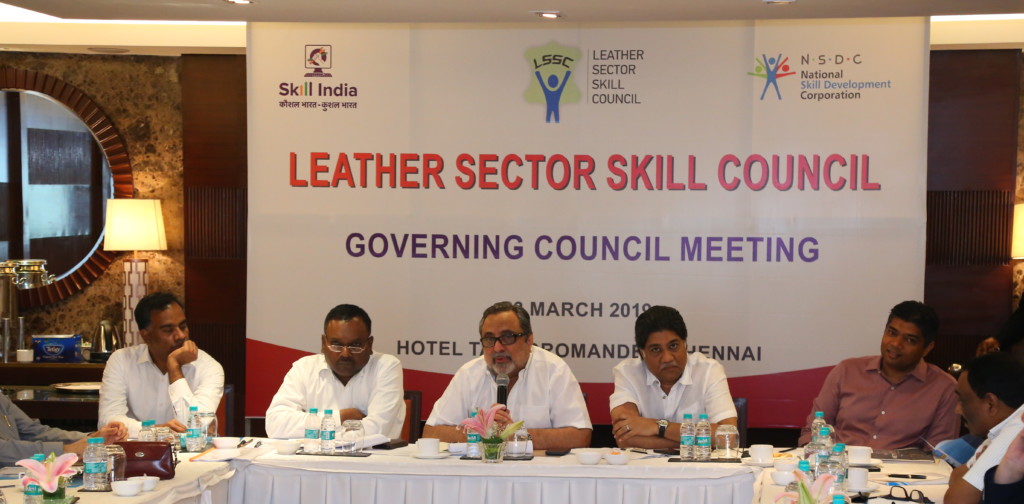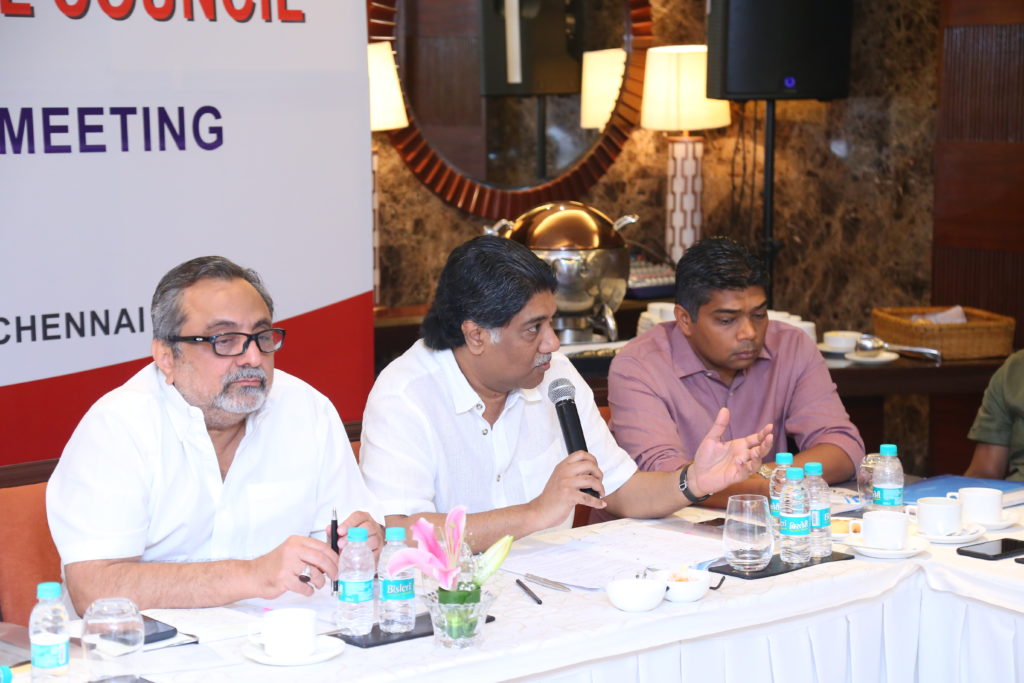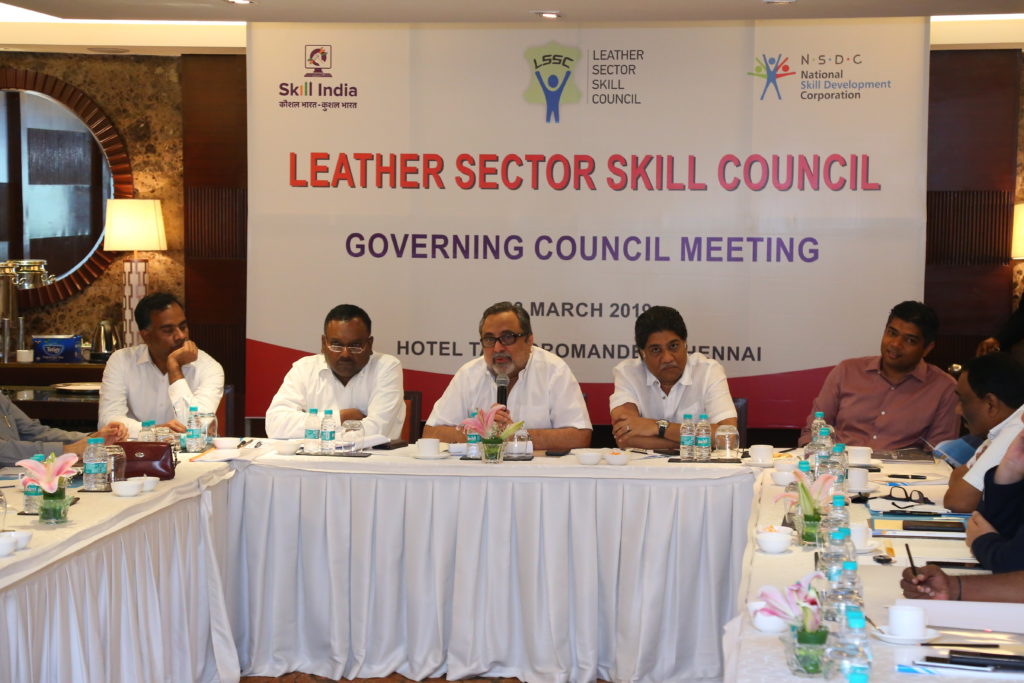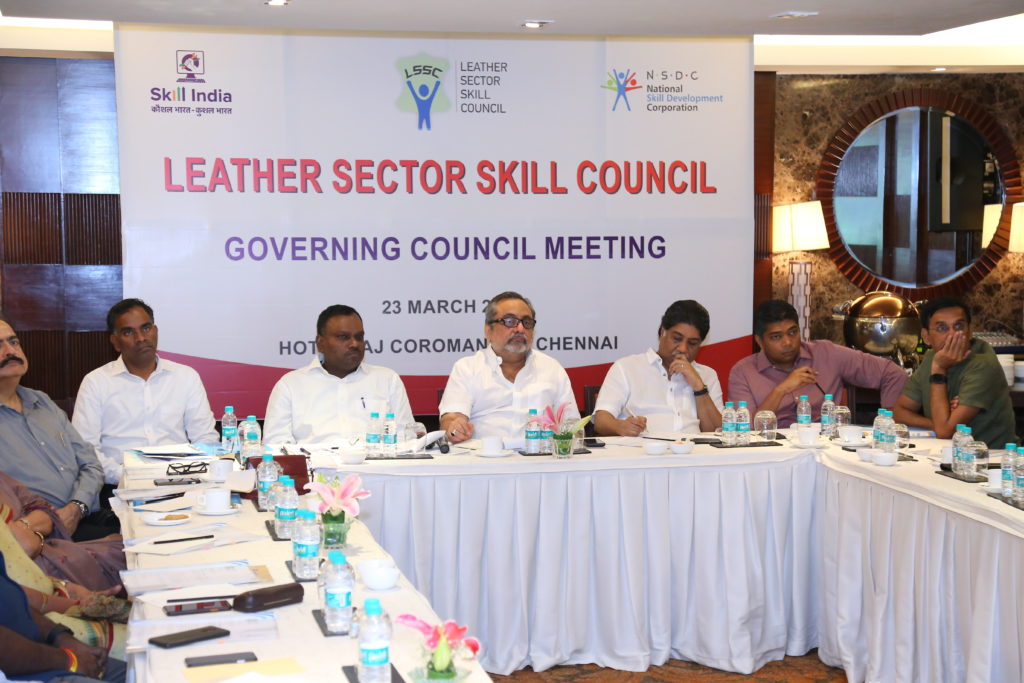



A Report on LSSC Governing Council Meeting held on 23rd March 2019

LSSC has conducted the Governing Council Meeting on 23rd March 2019 in Chennai. Mr. Habib Hussain, Chairman, LSSC, extended a warm welcome to the members of the Governing Council and all others who were present and introduced everyone to Mr. Gopal who was the chief executive in L&T and has taken over as the NSDC advisor to Shri. A.M. Naik the new Chairman of NSDC. Later, Mr. Gopal expressed his views on the scope for automation in the leather sector with special reference to the institute in Surat. After the inaugural speeches, the minutes of the previous meeting was reviewed and approved by all the members.
 Mr. R. Ramesh Kumar, IAS, CEO, LSSC, presented the overview and said that LSSC has been registered as a section 8 company and has been in operation since 2011. He emphasized on the fact that LSSC has produced positive results in many areas and there have been a few pitfalls which they will be worked on. He talked about the past performance in various schemes like PMKVY and other projects. He informed that members that so far, 1,06,000 people have been trained and 50 – 60% of them have been successfully placed. Information about some new models for some special projects were also given. He also described the 3 training models that are currently in operation; Bahadurgarh Model, Kanpur Model and the Model initiated by CFTI. While informing the house about the impact of Recognition of Prior Learning (RPL), he said that LSSC has been continuously interacting with the training partners and the industry to implement RPL certification and they have recently crossed the milestone of 1,00,000 certifications, thanks to RPL 4.0 Best in class Employer Scheme (BICE).
Mr. R. Ramesh Kumar, IAS, CEO, LSSC, presented the overview and said that LSSC has been registered as a section 8 company and has been in operation since 2011. He emphasized on the fact that LSSC has produced positive results in many areas and there have been a few pitfalls which they will be worked on. He talked about the past performance in various schemes like PMKVY and other projects. He informed that members that so far, 1,06,000 people have been trained and 50 – 60% of them have been successfully placed. Information about some new models for some special projects were also given. He also described the 3 training models that are currently in operation; Bahadurgarh Model, Kanpur Model and the Model initiated by CFTI. While informing the house about the impact of Recognition of Prior Learning (RPL), he said that LSSC has been continuously interacting with the training partners and the industry to implement RPL certification and they have recently crossed the milestone of 1,00,000 certifications, thanks to RPL 4.0 Best in class Employer Scheme (BICE).
Presenting more details about RPL Type 4.0 (BICE) Mr. R. Ramesh Kumar updated that Ministry of Skill Development and Entrepreneurship (MSDE) wants to analyze the existing skills of employees who are already employed and finding the skill gap which need to be addressed. In this process the employees are being assessed and certified in a very objective online tab based digital process. The launch of RPL Best in Class Employers scheme was held at Tata International Ltd on 24th July 2018 for 2000 people across Tata facilities. In a short span of time, LSSC has crossed the milestone by registering one lakh existing employees under the scheme. 23 Qualification Packs were put to use in the RPL Scheme and it is being implemented across 10 Clusters pan India.
 Later, discussing the training model implemented by CFTI, Mr. Ramesh Kumar said they collect the information in advance, based on the locality and make a temporary set up. They mobilize the candidates with the help of the state government and thus they have achieved 95% placement and they were also awarded as best trading provider. There is a pre-skilling program for the candidates as per the requirements of the industry. It’s a 1 year program, of which 6 months are allotted to classroom instruction and 6 months in spent the industry.
Later, discussing the training model implemented by CFTI, Mr. Ramesh Kumar said they collect the information in advance, based on the locality and make a temporary set up. They mobilize the candidates with the help of the state government and thus they have achieved 95% placement and they were also awarded as best trading provider. There is a pre-skilling program for the candidates as per the requirements of the industry. It’s a 1 year program, of which 6 months are allotted to classroom instruction and 6 months in spent the industry.
Subsequently, Dr. Swarna Kant, Sr Scientist, CLRI, talked about the B.Voc program. She said that they have designed the program in a way that it covers all the employability aspects. A component for soft skills and management has also been added in the Bachelor’s degree programme. The skill component is 50% and management component is 50%. She also explained how Level 5 to 8 degree programmes are implemented.
Mr P.R. Aqeel Ahmed, Chairman – CLE, suggested that training should be given to people on the shop floor in Mumbai since there is a training center available for training the manpower. He said it was crucial for the industry to grow since it would have a positive impact on the growth of retail sector, providing employment to many people
He was also of the view that in addition to the regular training program there should be a plan to increase the productivity and get profitable. For this purpose, he said, we need to educate by conveying the importance of time and increasing efficiency. This is the best way to ensure that a given number of pairs could be produced by each worker in a given amount of time.
 Mr. M. Rafeeque Ahmed informed the members about the global impact of training in the leather industry and need to interact internationally. He elaborated on importance of increasing productivity and becoming profitable through smart capacity building. It was brought to attention that the entire production in Vietnam is same as in India and it costs 3 dollars cheaper to make it here. He further informed the need to make synthetic footwear and mentioned the plans of seeking investments from Reliance and Tata.
Mr. M. Rafeeque Ahmed informed the members about the global impact of training in the leather industry and need to interact internationally. He elaborated on importance of increasing productivity and becoming profitable through smart capacity building. It was brought to attention that the entire production in Vietnam is same as in India and it costs 3 dollars cheaper to make it here. He further informed the need to make synthetic footwear and mentioned the plans of seeking investments from Reliance and Tata.
The meeting was concluded after the discussion on the formation of steering committee and reconstitution of the board. The meeting ended on a positive note with renewed emphasis on successful implementation of future skill development initiatives and the need for long term partnerships to ensure placements and encourage higher education in the leather sector.